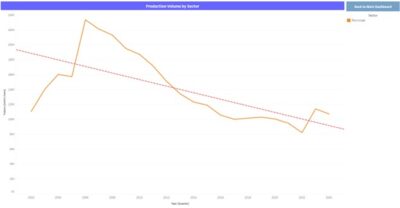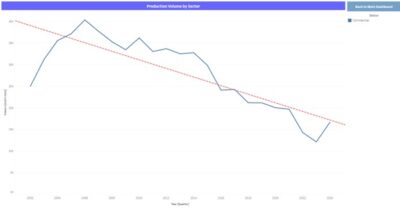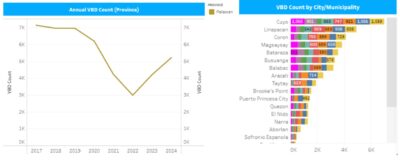Mercidar Fallout: Fisherfolk and experts unite in Palawan to defend coastal waters from illegal fishing and intrusion of commercial fishers
Press Release Date: August 12, 2025
Puerto Princesa City, Palawan — Opposing a controversial court ruling that would weaken critical fishing regulations and worsen overfishing, over 50 fisherfolk leaders, legal experts, and marine environment advocates gathered in Puerto Princesa to add their voices to stop the Mercidar case from allowing commercial fishing within municipal waters. The event, led by Oceana and the Environmental Legal Assistance Center (ELAC), seeks to clarify the ruling and coordinate community action to defend the preferential access of municipal fishers in their fishing grounds.
“Ang dagat ay nagsisilbing palengke, bangko, at ospital namin,” said Fredil Muid, a fisherfolk leader from the Calamian Tagbanua indigenous group of Palawan, and representative of the Indigenous Peoples in the National Technical Working Group for the National Plan of Action on Small-Scale Fisheries (NPOA-SSF), ensuring indigenous perspectives shape national policies. “Lahat ng kailangan namin, nakukuha namin sa dagat kaya inalagaan at binabantayan din namin ito, gaya ng pag-alaga ng dagat sa amin.”
The Mercidar Fishing Corp. vs. Republic decision, issued by the Malabon Regional Trial Court on December 11, 2023, declared key provisions of the Fisheries Code (RA 8550, as amended) unconstitutional. It struck down the legal definition of municipal waters, nullified local government jurisdiction, and removed preferential access for small-scale fishers inside municipal waters —a move that would open the 15-kilometer zone from the shoreline to commercial fishing operations.
The decision of the Supreme Court affirming the earlier ruling of the Malabon Regional Trial Court was made in August 2024 after the government’s appeal was dismissed for late filing and for failing to sufficiently prove that the lower court committed any reversible error.
On January 2, 2025, the Office of the Solicitor General filed a motion for reconsideration for the Department of Agriculture (DA) and the Bureau of Fisheries and Aquatic Resources (BFAR). Oceana and fisherfolk groups and local governments filed petitions for intervention, warning of the devastating impact on food security, marine biodiversity, and local livelihoods of the high court’s decision.
“This ruling threatens to dismantle one of the most important protections for our coastal waters. Without clear fishing regulations and effective enforcement, municipal waters become vulnerable to illegal fishing, overexploitation, and unfair competition that displace the very communities that have relied on these for generations. The finite resources in municipal waters that have sustained both commercial and municipal fisheries will be gone in no time,” said Von Hernandez, Vice President of Oceana.
According to data from the Philippine Statistics Authority (PSA), Palawan ranks third among the country’s top provinces in terms of fisheries production in 2024 with 123,245 metric tons (MT) of combined municipal marine and commercial fisheries. This takes 7.45% of the national total and the province follows South Cotabato and Zamboanga del Sur.
However, Palawan’s municipal marine and commercial fisheries production declined by more than half from their 2006 peak to 2024. Its municipal marine fisheries production decreased by 54% from its 2006 peak of 233,000 to 106,864 MT in 2024. Its commercial fisheries also decreased by 59%, from 40,000 MT in 2006 to 16,381 MT in 2024. The National Stock Assessment Program (NSAP) identified the province’s key species – sardines, roundscad (galunggong), mackerel (alumahan), threadfin bream (bisugo), and frigate tuna (tulingan) as already overfished.
The province ranks the highest nationwide in the number of apparent commercial fishing vessels inside municipal waters as detected by Karagatan Patrol. The intrusion of likely commercial fishing vessels numbered to 5,218 in 2024, from 2,989 in 2022 and are mostly found in the northern part of the province. A 2023 BFAR report estimated that 37,000 MT annually were caught illegally by commercial fishing vessels inside municipal waters in Palawan.
While a closed season for small pelagics is enforced in Northern Palawan, experts recommended the urgency to address illegal fishing and implement additional harvest control measures under Fisheries Management Area 5, which covers the entire province. These are necessary actions to restore its stocks and secure the future of Palawan’s fisheries and safeguard the nation’s seafood security.



Figure 3A. Total visible boat detections inside municipal waters in Palawan (2017-2024). 3BAnnual visible boat detections per Palawan municipalities. Data from Karagatan Patrol
Muid emphasized that fisherfolk have long served as custodians of the sea—and that weakening their legal standing puts ecosystems and communities alike in peril. “Huwag na sana nating hintaying maging alaala na lamang ang masaganang pangisdaan natin na ating kinamulatan,” he added.
The forum brought together fisherfolk from across Palawan, provincial and municipal government representatives, and BFAR and Philippine Coast Guard officials. Legal experts Atty. Rose-Liza Eisma-Osorio of Oceana and Atty. Grizelda Mayo-Anda of ELAC provided a briefing on the Mercidar ruling and outlined legal pathways to secure protection for municipal waters and fisherfolk despite the ruling.
“In a time of intensifying climate risks and resource scarcity, protecting municipal waters is a matter of survival for fisherfolk communities,” said Atty. Anda. “The weakening of fishing regulations invites illegal fishing and also hastens ecological collapse.”
Fisherfolk participants shared deep concern that removing legal protections for municipal waters will escalate conflict with commercial fishers and lead to the degradation of already strained fishing grounds.
“This is not only a technical legal issue, it’s also a direct assault on the constitutional guarantee that the marine wealth of the country belongs to its people and the preferential treatment in the use of municipal waters for poor artisanal fishers. tThe government must act with urgency to restore protections and close the legal gaps that now invite overexploitation and illegal fishing,” said Osorio, Oceana’s Senior Director for Campaigns, Legal and Policy.
Participants agreed on next steps including continued legal interventions, a stronger public awareness campaign to defend the 15-kilometer municipal water zone, and dialogues with lawmakers and local government officials to reinforce pro-fisherfolk fisheries governance. The session concluded with a renewed call to action: to fully implement the Fisheries Code and prevent municipal waters from becoming a free-for-all for commercial and illegal fishing activities. (END)
Oceana is the largest international advocacy organization dedicated solely to ocean conservation. Oceana is rebuilding abundant and biodiverse oceans by winning science-based policies in countries that control one-quarter of the world’s wild fish catch. With more than 325 victories that stop overfishing, habitat destruction, oil and plastic pollution, and the killing of threatened species like turtles, whales, and sharks, Oceana’s campaigns are delivering results. A restored ocean means that 1 billion people can enjoy a healthy seafood meal every day, forever. Together, we can save the oceans and help feed the world. Visit Oceana.org to learn more.
For More Information:
Joyce Sierra, Communications Manager, Oceana
Mobile: 09178214430 E-mail: jsierra@oceana.org
Facebook: www.facebook.com/oceana.philippines
Twitter: @oceana_ph Instagram: @oceana_ph
